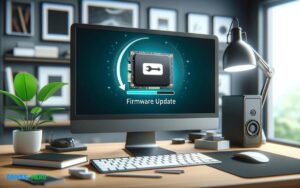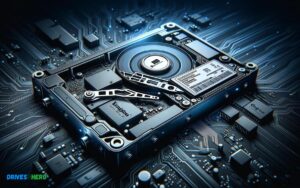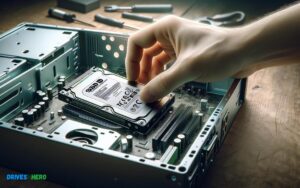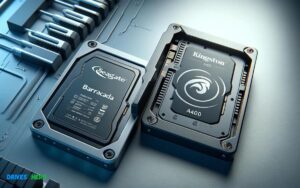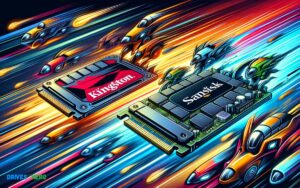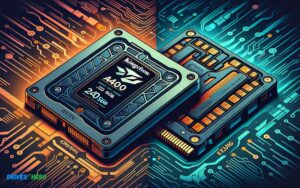Adata Ssd Vs Kingston Ssd: Which Option Is Preferable?
The ADATA and Kingston SSDs are both reputable solid-state drives that offer improved performance over traditional hard disk drives.
ADATA SSDs are known for their cost-effective storage solutions with a focus on performance, often featuring advanced specs like 3D NAND technology and SLC caching.
Kingston SSDs, on the other hand, are recognized for their reliability and wide range of options for both business and consumer markets, including budget-friendly models and high-endurance enterprise drives.
Choosing between ADATA and Kingston SSDs typically depends on specific needs and use cases:
- Performance: ADATA might offer faster read/write speeds in certain models, which is crucial for gaming or heavy data processing.
- Reliability: Kingston has a longstanding reputation for durability and quality, making their SSDs a safe choice for critical applications.
- Price: Both brands offer competitive pricing, but ADATA often provides a better cost-to-performance ratio.
- Warranty and Support: Kingston is known for its comprehensive warranty and customer service, which can be a deciding factor for many users.
- Product Range: Kingston offers a wide array of SSDs catering to various segments, while ADATA may have more innovative features in certain models.
Example Comparison:
- ADATA XPG SX8200 Pro: High performance, suited for gamers and power users.
- Kingston A400: Budget-friendly, reliable for everyday computing tasks.
When selecting an SSD, comparing ADATA’s innovation and performance with Kingston’s reliability and varied product line will help inform the best choice for your storage needs.
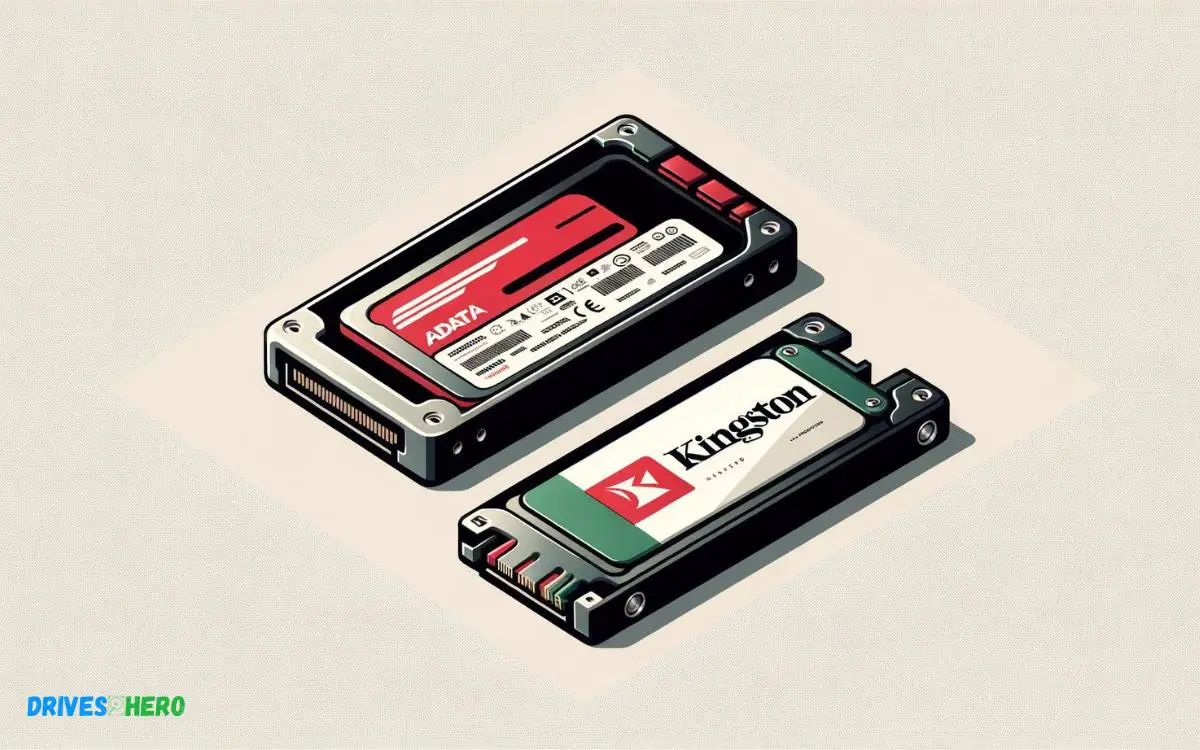
Key Takeaway
Understanding Ssd (solid State Drive)
When it comes to upgrading your computer’s storage capabilities or boosting its performance, solid state drives (SSDs) take the spotlight.
Both Adata and Kingston are trusted names in the storage space, offering a range of SSDs that cater to different user needs.
Advantages Of Ssd Over Hdd
The migration from traditional hard drives to SSDs is fueled by multiple advantages:
- Speed: SSDs deliver rapid boot times and swift data access, dramatically reducing load times and enhancing overall system responsiveness.
- Durability: With no moving parts, SSDs are less susceptible to physical shock and damage, offering greater longevity and peace of mind.
- Energy Efficiency: SSDs consume less power, contributing to longer battery life in laptops and energy savings in desktops.
- Silent Operation: The absence of moving parts means SSDs operate quietly, eliminating the hum or buzz typically associated with HDDs.
Evolution Of Ssd Technology
SSD technology has seen rapid advancements over the years.
| Generation | Interface | Performance Improvements |
|---|---|---|
| First Gen | SATA | Introduced the concept of flash-based storage, focusing on durability and shock resistance. |
| Second Gen | mSATA | Smaller form factors enabled SSD integration into laptops and portable devices. |
| Current Gen | NVMe over PCIe | Massive speed improvements with up to six times the transfer rates of SATA SSDs. |
With each iteration, SSDs have become more affordable and accessible, resulting in widespread adoption among users seeking superior performance and reliability.
The trajectory suggests a future where SSDs may become the universal storage solution for all computing needs.
Adata Ssd: Features And Performance
Exploring the competitive world of solid-state drives, Adata SSDs stand out with their impressive speed and reliability.
Contrasting with Kingston SSDs, Adata offers innovative features like robust data protection and durability, ensuring excellent performance for both everyday users and tech enthusiasts.
Adata Ssd Product Range
Adata offers a diverse array of SSD options that cater to different market segments:
- XPG Series: Targeted at gamers and enthusiasts, these drives boast top-tier speed and durability.
- Ultimate Series: These offer a balance between performance and cost-effectiveness, making them suitable for mainstream users.
- Industrial Series: Built for harsh environments and continuous operation, ideal for industrial applications.
Adata Ssd Technology And Specifications
- The technology and specifications backing Adata SSDs are nothing short of cutting-edge:
- 3D NAND Technology: Adata SSDs utilize advanced 3D NAND flash for improved density and reliability.
- SLC Caching: This feature accelerates burst write performance, crucial for high-intensity tasks.
- Error Correction: Capable error correction algorithms enhance data protection.
Comparing Adata Ssd Performance
Let’s dig into the numbers and compare the performance of Adata SSDs:
| Model | Read Speed (MB/s) | Write Speed (MB/s) | Interface |
|---|---|---|---|
| XPG SX8200 Pro | 3500 | 3000 | NVMe |
| Ultimate SU800 | 560 | 520 | SATA |
Kingston Ssd: Features And Performance
Exploring Adata and Kingston SSDs reveals a competitive landscape in speed and reliability.
Adata drives often shine with aggressive pricing and robust performance, while Kingston SSDs boast undeniable durability and consistent quality, choosing between them hinge on individual needs and preferences.
Kingston Ssd Product Range
Kingston offers a broad range of SSDs to suit various user needs.
The product lineup includes:
- Kingston A400: An affordable entry-level option for casual use.
- Kingston UV500: A mid-tier SSD with hardware encryption for data security.
- Kingston KC600: Designed for high performance with full capacities.
- Kingston KC2500: Targeted at high-performance users with NVMe technology.
Kingston Ssd Technology And Specifications
Each Kingston SSD includes distinctive technologies and specifications:
- 3D NAND: Kingston SSDs utilize cutting-edge 3D NAND technology to increase storage capacity while reducing cost and power consumption.
- SATA and NVMe Interfaces: Options for both SATA and NVMe provide versatility for users looking to balance budget and speed.
- Marvell and Phison Controllers: Relied upon for their performance and reliability, these controllers manage storage and transfer speeds effectively.
| Model | Interface | Max Read/Write (MB/s) |
|---|---|---|
| A400 | SATA 3 | 500/450 |
| UV500 | SATA 3 | 520/500 |
| KC600 | SATA 3 | 550/520 |
| KC2500 | NVMe PCIe | 3500/2900 |
Analyzing Kingston Ssd Performance
Performance analysis of Kingston SSDs reveals their strong suit in various tasks:
- Day-to-day Computing: The A400 and UV500 are great for everyday computing with adequate speed improvements over traditional HDDs.
- Advanced Computing Needs: The KC600 offers a balance between cost and performance, perfect for multitasking and higher workloads.
- High-End Performance: For the enthusiasts and professional users, the KC2500’s NVMe interface provides exceptional speeds suitable for demanding applications.
When assessing performance, metrics such as IOPS (Input/Output Operations Per Second), read and write speeds, and overall durability play a significant role.
Kingston SSDs consistently report high IOPS, indicating their ability to handle multiple operations with ease.
Adata Vs Kingston: Price And Affordability
Adata SSDs often present a more cost-effective choice for budget-conscious consumers, offering competitive performance at a lower price point.
Kingston SSDs, while slightly higher in cost, provide renowned reliability and consistent quality that many users trust.
Adata Ssd Price Range
- Entry-level series: Affordable, built for average consumers for everyday use
- Mid-range series: Balanced performance and price, suitable for gamers and professionals
- High-end series: Higher-tier, boasting superior speeds, targeted towards enthusiasts
Typical pricing for Adata SSDs can range from as little as ${price_of_lowest_adata} for a basic 120GB design, soaring up to around ${price_of_highest_adata} for a heftier 2TB premium model.
Kingston Ssd Price Range
- Value series: Economically priced, ideal for budget-conscious users
- Performance series: A step-up in speed and capacity, meant for advanced users
- Enterprise series: Top-of-the-line, with optimal performance for high-demand systems
User Experience And Reliability
Exploring Adata and Kingston SSDs reveals a keen focus on enhancing user experience with fast, dependable storage solutions.
Both brands consistently strive for reliable performance, though nuanced differences cater to diverse user preferences and requirements in the realm of solid-state drives.
Adata Ssd Price Range
- Entry-level series: Affordable, built for average consumers for everyday use
- Mid-range series: Balanced performance and price, suitable for gamers and professionals
- High-end series: Higher-tier, boasting superior speeds, targeted towards enthusiasts
Kingston Ssd Price Range
- Value series: Economically priced, ideal for budget-conscious users
- Performance series: A step-up in speed and capacity, meant for advanced users
- Enterprise series: Top-of-the-line, with optimal performance for high-demand systems
Conclusion
Navigating the landscape of SSD choices, it’s clear both Adata and Kingston offer compelling options. Your needs define the winner: seek Adata for innovation and value, or opt for Kingston’s reliability and customer service.
Regardless of choice, upgrading to an SSD is a smart, speed-enhancing move that transforms computing experiences. Choose wisely and boost your system’s performance today.

